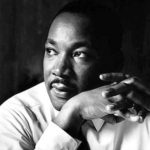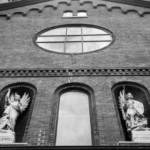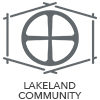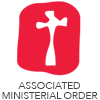The past year has been a bewildering time of battling cancers, Acedia (the noon-day demon), and attempting to find a way.
Prof. Rev. Dr. Doug Hardy prescribed I read Kathleen Norris’ Acedia and Me: A Marriage, Monks, and A Writer’s Life. The book (and audiobook) have been very helpful. I don’t know if I am afflicted by Acedia, but I know some life malaise has tormented me for one and two third’s year.
Acedia is the brave brash noonday demon who afflicts the passionate. It is the demon of ascetics, monks and hermits. It causes one to languish and fall into a stupor. I have described it as a lack of confidence, a doubt. Not a faith-doubt. I’ve never had that except in the most academic sense (‘could there be or not be a god’). Instead it has been a paralyzing doubt. Pile on our family struggling through multiple cancers, and it has been like a dream that comes just before dawn.
Through all this I continue to find a way that slowly perculates through my thoughts. Mostly I continue to think about the ontology of church (ontology means “essences or nature of something”). And I am saddened at the lack of evangelicals to even consider the Bride of Christ, the Body of Christ as something all of us draw our identity from. I continue to NOT read the latest greatest paperback about how to do successful ministry, what the Bible “really” means, and in general, how to get a spiritual boost. These all annoy me. Is this the temptation of Acedia? Maybe. I am more than aware of its nagging. After I get through pondering the meaning of “church” I am left with only the private individual’s faith experience. The myth of the private Christian is most disturbing to me because a) it leaves us with no need for church – the divine communion, and b) the private Christian reduces faith down to a cheap controllable self-help session.
But I am convinced that much of private Christianity has reduced Jesus down to a means to eternal life, while not desiring to be with Jesus. More so, I am aware that many private Christians really want self-help instead of a death to self. As Dr. Scot McKnight said it ‘many believe in Jesus but not God.’ Or stated: ‘salvation but not miracles.’ Or Dr. Dallas Willard: “vampire Christians” – we only want Jesus’ blood. This is often referred to as ‘personal salvation.’
More: Instead of spiritual disciplines we teach buzzy Bible history, archeology, sociology – fun facts about the Bible; instead of divine mystery we teach leadership, instead of prayer we teach evangelism techniques; instead of the praying the Psalms we teach apologetics. And instead of being with people we accumulate and spend. We private Christians falsely think we are not of this world – we think we are citizens of heaven because we think someday we will die and disappear to a far away place called heaven. But instead we buy the same things the world buys. We entertain ourselves like the world does. We easily and blindly endorse the world’s economics about the poor, the world’s politics about who is our enemy and what we are entitled to, we share the world’s ideas about the good life and success.
Meanwhile we judge the world as immoral and ungodly:
“those sinners, those Democrats, those Republicans, those homophobes, those gay marriage people, those Baptists, those Catholics, those abortionists, those divorcees, those homeless, those immigrants, those rich people, those who take God’s name in vain, those who break the speed limit when they drive… I’m not like them. I’m a good person.”
And so instead of being “in the world and not of the world” we private Christians have accomplished just the opposite: we are of the world but not in the world. No wonder we need gimmicks and techniques for sharing the gospel – because no one wants to buy us. For I am afraid we have become Pharisees, tithing our mint and dill and failing to show basic compassion to even our aging and ailing parents. We like the label of Christian, but we are actually just religious moralists. A Christian is in Christ.
Through all this we must find a way. We must accomplish one small task at a time. Any task. Finish it. We may consider the complexities of life, but we must not let that thought drag us down to paralysis and quitting. Each new season is a challenge. The grand mistake is to believe we confront the future by our own strength. In one word: Control. We are masters of Control. Control denies the presence of the unknown, unbidden and uncontrollable g-d. The daily bread of faith is relinquishing control.
The Psalms are still the classic time-tested means of talking back to g-d the words of g-d. The Psalms are not primarily handy information about life and g-d as much as they are the deep-space B-flat of Logos – the Thought, the Brooding over the deep, the Light. We don’t “read” the Psalms, we pray the Psalms. But in this case, the Psalms pray us. We spectate ourselves interacting with the Voice of g-d. The result should be quietude. Silence. Stillness. Intensity and Sighing. Communion with an indescribable Divine Presence.
This sort of prayer is more like describing eating and drinking – you can try to describe the fresh baked bread – but the best you can do is try – you can’t actually word-out eating fresh-baked bread. You just eat it. Travel to any winery and read the feeble words attempting to describe each wine and you will know how difficult it is to word-out the palate… smoky, fruity, cashew, oaken, burnt, toothsome, tinny, cherry. Pray the words of g-d and you might as well use the same glossary: silver, foggy, dark, blinding, lemon, syrup, pressing, falling.
I spent the majority of my Christian life misunderstanding the Psalms. I thought they were like Galatians – read them to glean theology and ministry know-how. Okay, but not primarily. We read the Psalms to surrender control. In this understanding we read them as purely spiritual. They are water to a man lost in the burning desert. This is not self-help or a cheap boost or pep-talk. The Psalms are what we recite as we find our way along a pitch black corridor deep underground.
Acedia.
Cancer.
Private Christianity.
Moralism.
The clenched jaw against all these is the spiritual discipline of the Psalms.
Lord have mercy.
Christ have mercy.
Lord have mercy.
Do we read the above words or pray the above words? Understand the difference and you’ll understand how to read the Psalms.
May the coming season find us in the presence of g-d. May the Psalms be on the tip of our tongue without our conscious knowing.








